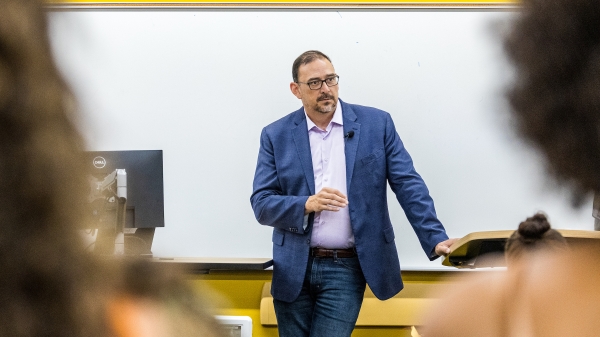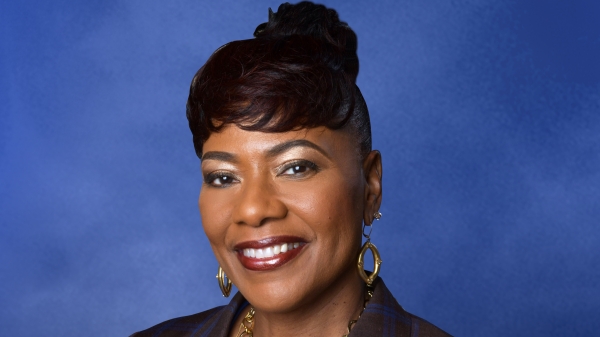ASU Law student helps high school students learn what it takes to break into the sports industry

Zade Shakir, a third-year ASU Law student, launched the Emerging Sports Leaders Program this fall.
Having achieved his dream of working in the sports industry, a student at the Sandra Day O’Connor College of Law at Arizona State University is helping local high schoolers do the same.
Zade Shakir, a third-year ASU Law student, launched the Emerging Sports Leaders Program this fall. Through the program, Shakir and other ASU Law students help teach a sports law class every other Monday at Scottsdale’s Horizon High School, explaining the behind-the-scenes sports world while giving specific guidance on how to get into the highly competitive industry.
“The program is an initiative to teach high school students how to break into the sports industry, while along the way teaching them essential professional skills that are translatable to any career or any profession,” he said. “It’s targeted to high school students, and it’s led by myself and other ASU Law students and ASU Master of Sports Law and Business students.”
Lucas Ramirez, who teaches the class, said Shakir took the initiative to offer the program.
“He just reached out,” Ramirez said. “I believe he saw that we were one of the few high schools out here in the Valley that has a sports-focused law class, and I was the first one he reached out to, and I liked what I heard, so we went from there.”
Shakir, who grew up in the Bay Area, has always been interested in sports. He played soccer from the age of 3 until he was an undergraduate at the University of Southern California, where he played for USC’s soccer team. And his inspiration for the program can be traced back to his time in high school.
“I was an athlete and knew I wanted to be involved in the sports world in some capacity, but I didn’t really know what it took to work in the industry,” he said. “And I wasn’t really talented or athletic enough to play professionally.”
He got his first big break working for his hometown Golden State Warriors, then the Arizona Diamondbacks and, now, the Phoenix Suns. And that has opened his eyes to a world of professional opportunities.
“Because of my experiences working for those teams, I wanted to share what I’ve learned with students who are similarly situated to how I was in high school, where they know they want to break into sports in some capacity,” he said. “I wanted to share advice on how to make that happen and introduce them to different career paths within the industry, whether it be working in law, marketing or corporate sponsorships.”
Class is in session
On a recent Monday morning, Shakir and fellow ASU Law student Zubin Kottoor arrive early at Horizon High to teach the 9:30 a.m. class. It’s a considerable time commitment for the busy law school students, but a gratifying experience.
“It’s a great opportunity to give back to the community,” said Kottoor, a student in the Sports Law and Business program.
In a tag-team approach, Shakir starts the class, reviewing a previous assignment to conduct an informational interview with a notable figure in the sports industry. Having circled back with the interviewees, he gives detailed feedback, commending the students for their poise, listening skills and ability to adapt mid-interview. And he again stresses the importance of a courtesy follow-up email.
“Knowing how to send a professional email is such an underrated skill,” he said.
Zade Shakir teaches students at Horizon High School in Scottsdale.
Shakir conducts an exercise on competitive balance, asking students to consider if the continued dominance of a single “superteam,” like the current Golden State Warriors’ roster featuring All-Stars Kevin Durant, Steph Curry, Klay Thompson, Draymond Green and DeMarcus Cousins, could be problematic for the NBA in the future. If so, he asks them to propose possible solutions for restoring parity. Most of the students see no problem with it, but Shakir gives them a history lesson, explaining how, in 2011, then-NBA commissioner David Stern vetoed a trade that would have sent star point guard Chris Paul to the Los Angeles Lakers to join Kobe Bryant. That draws a surprised reaction from the young students, who have grown up in an era of unchecked NBA superteams. It allows Shakir to make a point about leagues always wanting to protect what is in their “best interests.”
Kottoor then takes over and walks students through the structures of the NBA, NFL, NHL and Major League Baseball, explaining that players are employees of their respective teams, not the leagues. After a review of league commissioners and collective bargaining agreements, the students are engaged in a discussion about player punishments.
Shakir then presents the students with a hypothetical, involving a star 19-year-old NBA player caught on video drinking at a nightclub and getting into an altercation. The students’ homework assignment: Advise team management on how to address the situation and respond to a query from the NBA commissioner on whether league punishment should be considered. The students are reminded, again, to always consider what is in the “best interests” of the league.
Big-league assignments
In addition to the biweekly lectures, the program involves a second component, which Shakir calls The Pitch Project.
“The Pitch Project is designed to put these high school students in front of real-life industry executives in the sports world, and present them with a project that would allow for them to put the skills and concepts that we are teaching them into practice,” he said. “This semester, we’re working with Phoenix Rising FC, and they’ve helped craft a set of hypothetical questions to pose to the students. What kind of corporate partners should Phoenix Rising FC engage with? How can they better drive merchandise sales? How can they increase viewership? Questions like that.”
At the end of the semester, the students will travel to the team’s stadium, where they’ll present their solutions to Phoenix Rising FC’s executives.
Ramirez says the students were a little overwhelmed at first when presented with such high-level assignments, but they are excited about the challenge and love what they are learning.
“It’s all been positive,” he said. “They’re really starting to enjoy it.
“I think it’s fantastic. It doesn’t just make connections to the sports world, but it helps prepare them for real life and what college will be like, no matter what career path they go into. Working together as a team, working on different projects, assignments: It all correlates with the future for them, so it’s great for high school kids.”
For his part, Shakir just focuses on teaching the students what he wishes he would have known at their age.
“I knew I wanted to work in sports growing up, but I didn’t really know how to make that happen,” he said. “And as I went through undergrad and went through the law school, I started to realize how difficult it was to break into sports and how competitive the industry is. Had I known in high school some of the things that I know now — lessons about professionalism and the sports industry that I’ve learned through experiences that I’ve been incredibly fortunate to get — I could have done so much more to set myself up in pursuit of my ultimate goal of working in sports. I just want to help high school students learn those things and get a step ahead.”
And it’s also a chance to help make connections between ASU Law and the community.
“I saw this as an opportunity for ASU — ASU Sports Law and Business, specifically — to get more involved in the community, develop relationships with local schools, and share the incredible wealth of resources and experiences that we have at our disposal,” he said. “But the primary goal of the program is just to pay it forward and help high school students develop a strong, transferable skill set that will hopefully make them game-changers in the industry one day.”
More Law, journalism and politics

ASU's Carnegie-Knight News21 project examines the state of American democracy
In the latest project of Carnegie-Knight News21, a national reporting initiative and fellowship headquartered at Arizona State…

Arizona secretary of state encourages students to vote
Arizona Secretary of State Adrian Fontes looked right and left, taking in the more than 100 students who gathered to hear him…

Peace advocate Bernice A. King to speak at ASU in October
Bernice A. King is committed to creating a more peaceful, just and humane world through nonviolent social change.“We cannot…
